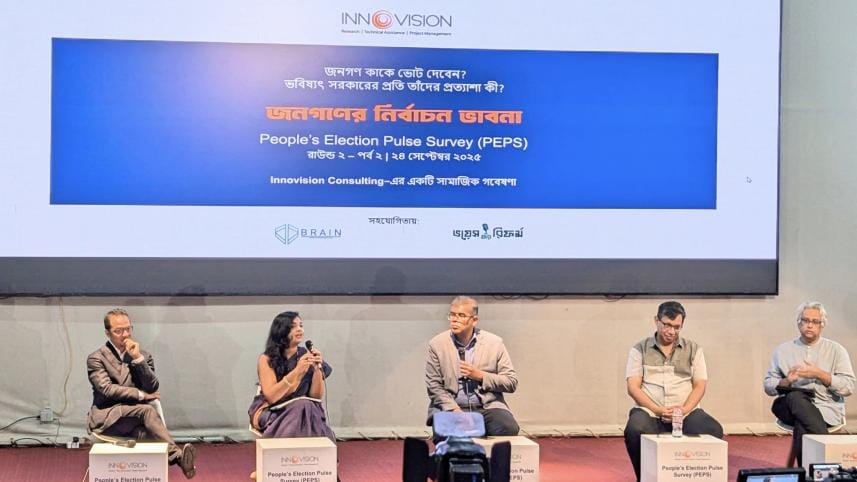Law and order tops voter priorities

Improving law and order has overtaken price control as the top public expectation from the next government, according to the latest round of the People's Election Pulse Survey.
Of the 10,413 respondents, 57.5 percent identified law and order as their foremost concern, while 54.6 percent pointed to controlling price hikes.

Reducing corruption was cited by 36.9 percent, and 20.3 percent called for legal reform.
The second round (phase 2) of the survey, conducted by Innovision Consulting between September 2 and 15, marks a notable shift in public expectations.
In the first round held in March, 71.2 percent of respondents placed price control at the top of their list, compared to 52.2 percent who prioritised law and order.
According to the survey findings presented yesterday at the Bangladesh National Archives Auditorium, 39.1 percent of the respondents consider the BNP the "most suitable party" to form the next government, Jamaat-e-Islami 28.1 percent, Awami League 17.7 percent and the National Citizen Party 4.9 percent.
In terms of perceived chances, 40 percent of the respondents said they believe the BNP is "most likely to form the next government", while 23.3 percent answered Jamaat and 12.1 percent Awami League.
The survey covered voters in 521 Primary Sampling Units. Of the respondents, 69.5 percent were in rural areas and 30.5 percent urban.
Md Rubaiyath Sarwar, managing director of Innovision and lead researcher, shared findings from the second report, which focuses on political choices and electoral outlook.
Discussing the results, Asif M Shahan, professor at Dhaka University's development studies department, pointed out that many voters remain undecided.
"Most of the respondents believe BNP is likely to form the next government. In such a scenario, undecided voters may lean towards the BNP, thinking, 'Let's not waste my vote,'" he said.
Asked if they would vote, 57.8 percent respondents answered "yes", down from 62 percent in the first round. Willingness to reveal voting choice rose to 83.2 percent from 65.7 percent.
Among 5,673 respondents who disclosed their voting choices, 41.3 percent supported the BNP, 30.3 percent Jamaat, and 18.8 percent Awami League. NCP and Islami Andolan Bangladesh received 4.1 and 3.1 percent support among the respondents.
Among Gen Z voters, the BNP was supported by 34.3 percent of the respondents, Jamaat 32.8 percent, Awami League 18.8 percent, and NCP 6.8 percent. BNP's main backing comes from older generations, whereas Jamaat finds stronger support among the youth.
When asked what mattered most in choosing a candidate, 65.5 percent of voters cited the candidate's qualifications, 20 percent pointed to the party manifesto, and 14.7 percent to the party symbol.
Discussing the facts, Zyma Islam, senior reporter at The Daily Star, said nearly one-third of the population are young voters, whose preferences had remained largely invisible. "After the Ducsu election, we're finally seeing the contours of youth voting preferences," she said.
Citing the survey, she said a majority of voters are not swayed by party symbols. They are choosing candidates based on capability and qualities, not manifestos. They want tangible changes and actions, not promises, she said.
Jamaat received the highest satisfaction rating at 30.3 percent in local politics, followed by BNP at 21.5 percent. Awami League faced the highest dissatisfaction, with 33.4 percent expressing discontent.
Asked about Awami League's participation in the next election, 45.8 percent said all parties should be allowed to contest, while 45.6 percent said the party should not be allowed in elections before trial.
If the Awami League does not participate, BNP's support would rise to 45.6 percent, Jamaat's to 33.5 percent, and NCP's to 4.7 percent, according to the survey. Additionally, 8.3 percent respondents said they would abstain.
On foreign policy, 72.2 percent said Bangladesh should maintain good relations with India, while 69 percent said the same about Pakistan.
In another part of the survey, young voters rated Bangabandhu Sheikh Mujibur Rahman the highest among past leaders. Among Gen Z, 20.8 percent gave him a perfect score, followed by Ziaur Rahman (15.5 percent), Khaleda Zia (10.6 percent), Sheikh Hasina (8.6 percent), and HM Ershad (4.4 percent).
Bangabandhu and Ziaur Rahman stood out as the most popular leaders across generations. Nearly half of all respondents rated each above 70 percent, with strongest support among voters aged 60 and above.
Meanwhile, Hasina received the highest proportion of zero-score ratings, with 21.6 percent giving her a rating of zero. Ershad followed with 13.7 percent, while Bangabandhu received 8.8 percent. Khaleda Zia and Ziaur Rahman had the lowest zero ratings, at 5.6 and 4.4 percent.
The study was conducted in collaboration with Voice for Reform and the Bangladesh Research Analysis & Information Network (BRAIN).
Shafiqur Rahman, executive director of BRAIN, also spoke at the event, moderated by Fahim Mashroor, joint convener of Voice for Reform.



 For all latest news, follow The Daily Star's Google News channel.
For all latest news, follow The Daily Star's Google News channel.
Comments